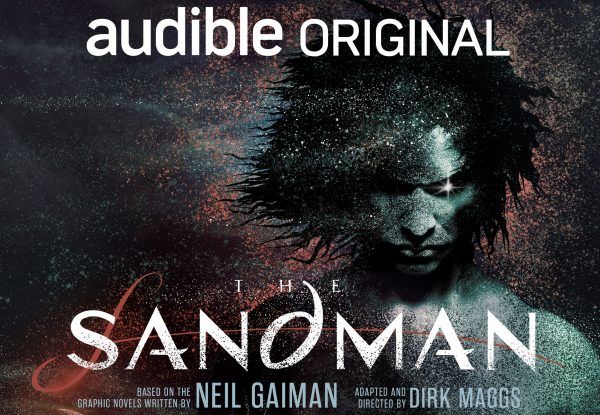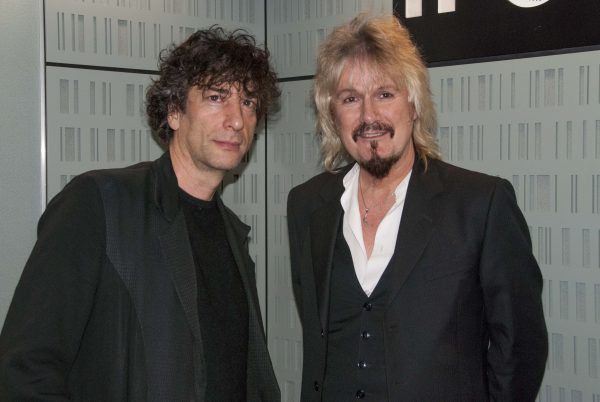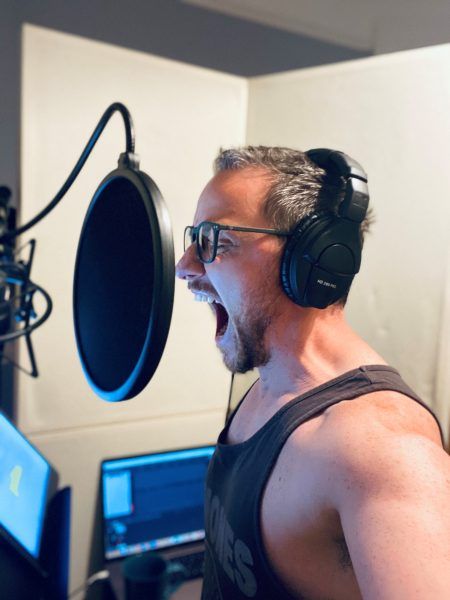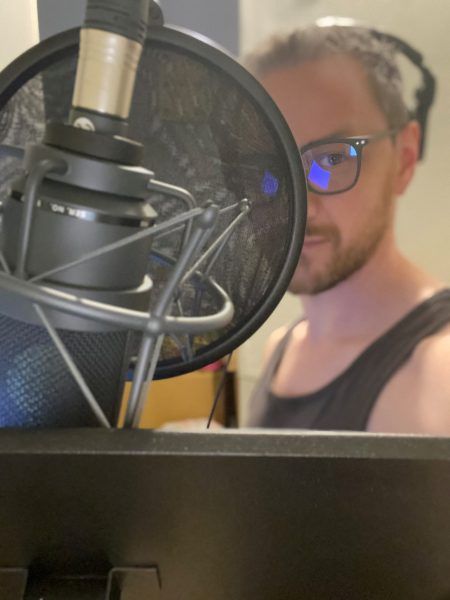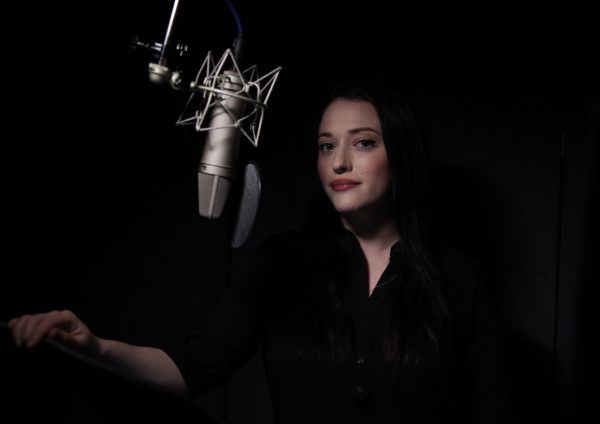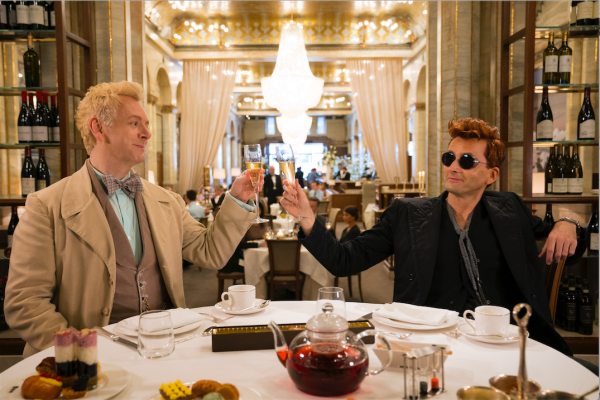Given the subject matter, being stranded in "development hell" might feel more than apt: Of all the comic book properties that have evaded adaptation to other mediums, The Sandman might be one of the most legendary. But now that Neil Gaiman has learned to speak "fluent showrunner" thanks to his work on last year's adaptation of Good Omens, things have changed dramatically.
However, while Gaiman is currently at work on a Netflix adaptation of the series with executive producers Allan Heinberg and David Goyer, the first Sandman adaptation to ever actually be completed isn't on screen. Instead, this week Audible has launched the first part in what promises to be an epic audio-only experience, adapted and directed by Dirk Maggs (who first wanted to adapt Sandman for the radio in 1992). The cast is incredible, including James McAvoy, Michael Sheen, Riz Ahmed, Justin Vivian Bond, Arthur Darvill, Kat Dennings, Taron Egerton, William Hope, Josie Lawrence, Miriam Margolyes, Samantha Morton, Bebe Neuwirth, and Andy Serkis, and it's anchored by Gaiman as the Narrator, keeping the action moving while reading descriptions drawn from his original comic book scripts.
Details on the Netflix series are a bit scarce, in part because production on the Netflix series was shut down by the pandemic, but in this extended interview with Collider, Gaiman explains that because the Audible adaptation is extraordinarily loyal to the comics, he looks at it as a "control group" that lets him and the Netflix writers experiment with making changes to the original story. He also reveals what kind of changes they're looking to make, as well as getting into how they were able to assemble such an all-star cast for the Audible adaptation, and if that cast might affect the choices being made for the live-action series. (Crossing my fingers hard that Dennings can reprise the role of Death.) Watch the full video of our conversation above, or read the lightly edited transcription below.
Collider: Revisiting The Sandman, which is about the world going mad in its own way — it hits in a different way right now.
NEIL GAIMAN: It's very weird in that Sandman was... I started writing it 33, 34 years ago, and it was very much of its time, as far as I was concerned. I wasn't trying to create something for the ages. I was trying to create something that was about what I was concerned with at that time. And yet it seems to have lasted so much better than I would have imagined. And it seems to speak to us sometimes from 33 years ago, and to have opinions on things that are very now. And I find that peculiar and occasionally prescient. And sometimes I want to go back in time and go, "Okay, well, I think, young Neil was a radio tuned to interesting stations." But mostly I just think that sometimes the world takes a while to catch up with things. And I think there are definitely places where stuff that we were writing about, stuff I was writing about and people were drawing 30 something years ago, I may not have got it exactly right, but I was definitely talking about the things that we're concerned with now.
As a perfect segue, of course, you're talking about how the Audible adaption came around — because what was the genesis of the project?
GAIMAN: The genesis of the project is 1992 when a young BBC producer/director/writer named Dirk Maggs did his adaptation of The Death of Superman for the radio in the UK. And it was a huge hit and he was asked what he wanted to do next. And he said, "Well, Sandman." And he got in touch with me. I loved the idea. We corresponded. And the BBC said, "Absolutely not." And so that was where this began. And neither of us forgot. And in later years, we got to work together. We got to do stuff on The Hitchhiker's Guide To The Galaxy. I played the voice of the book. We did Neverwhere, Good Omens, Stardust, Anansi Boys, How the Marquis Got His Coat Back, and had a wonderful time doing for the BBC.
And then when Dirk went onto Audible, I honestly don't remember which of us came up with the idea of doing Sandman for Audible, probably Dirk. But we'd been talking about it by that point for 28 years, just the idea of how to do it. And I think also what became very interesting was just the idea for me that this could be the audiobook we'd never been able to have. It had always seemed sad and frustrating that people would come up to me and say, "I'm visually impaired, I'm blind, or I cannot see, whatever. And I would like to read Sandman. Are there any audiobooks for the graphic novels?" And I would have to say, "Well, no, there really aren't." And one reason why there aren't is because you can't just have somebody sitting in a studio on their own and reading a script, that will give you the equivalent experience of reading a graphic novel.
So we have here graphic novels that tens of millions of people have been able to read all over the world. And I love the idea that they're getting opened to a whole new audience. They're getting open to an audience of people who are visually impaired. They're getting opened to an audience of people who cannot or will not, or do not have the kind of brains that process comic books. They're getting opened to an audience of people who know that they love Neil Gaiman stuff, but had heard that Sandman existed, but never really knew where to start, or how.
So for all of those people, we're giving them Sandman, and we're getting it pretty much as it was created. We're not trying to change it. We're not trying to fix it. Whereas for the Netflix series, there's definitely the intention that we're going, "Okay, well, if this were now, if I was creating Sandman now, would I have done that thing? Would I have written that? Probably not. Would this character had been that gender? Probably not. How would I have done that? I probably would have done that differently." So we're doing some of that stuff now and just enjoying ourselves.
I've listened to the first eight chapters and then I pulled out from my library Preludes and Nocturnes and it was really fascinating to compare the two, because you're completely correct, it does feel like a very faithful adaptation — with times where you have two minutes of description in the audio version for just two pages.
GAIMAN: Well, what was lovely with those is I was able to find all my original scripts for the artists. So I could give the scripts to Dirk and he could go and actually lift what I wrote for artists and summarize that, or take actual lines that I'd written for a specific artist to describe something for them.
And that's lovely, just because that's a part of the process that most audiences never get to experience with comics.
GAIMAN: Absolutely.
In terms of that, you've touched on this already, but I feel like all writers look back on their early writing and sometimes it's with some level of, "Oh goodness, why did I write that, that way?" Not only are you reading this, but a lot of times you're saying writing from several years ago. How was that experience for you?
GAIMAN: Sandman was harder. The first eight issues of Sandman were probably harder for me while I was writing the last eight issues. I would look at them and go, "Oh my gosh, I was so clunky back then and look how much better I am now." Whereas now I can just look back at the whole thing and go, "You know, baby Neil who wrote it had an awful lot to learn, but he did a lot right." And look at him trying all this stuff out and trying to figure out who he is. It's like watching you when you were a teenager putting on hats and glasses and different styles and changing your hair around and just sort of going, "Who am I, what do I look like?"
I love looking at those first Sandmans and I can go, "Okay, well the first one I'm doing this. And then the second one I'm doing DC Comics and I'm doing all of this stuff. And by the third one, I'm doing contemporary, urban horror. And by the fourth, I'm trying to do the thing that John W. Campbell did in Unknown Magazine in the 1940s. And then by episodes five, six, and seven, I'm trying a superhero fantasia that is still hard-edged horror and goes as dark as it can go. And then basically after that, I'm pretty much done actually with horror. I've gone, Okay, well, that was really interesting. What else can I do? And now here I am in Africa 10,000 years ago and creating a tale and a character. And here I am doing The Doll's House and now I'm going to go off and do Season Of Mists. And there's a level on which I became technically more skillful, but I also found out for myself what kind of a writer I was and what I could do. And I didn't know.
So I don't ever wind up looking at any of this as something where I go, Oh, now is my chance to fix this thing that you screwed up. I definitely know that there are things that if I were doing them now, I would not do them like that. But then I also think you have to be allowed to make mistakes, because if you don't make mistakes, you don't do anything.
How has being involved with this project influenced what you're doing with the Netflix series?
GAIMAN: In a scientific experiment, this would be the control [group]. It's like, "Okay, here's the one where we're not going to change anything. We're going to adapt it, but we're going to keep it the same." This allows Allan Heinberg and David Goyer and I to have conversations where I can actually say, "Ah, okay, now if you want to do that, we've done that in the Audible version, and this is how it works. But I think maybe we could actually take it over here or maybe we could do this."
And it's very liberating actually, having one that is the pure control that means that we know where the doors are open for Netflix and where we can go, "Okay, well, this character is male in the original, is there any particular reason why this character has to be male? Oh, there was no point at which this character desperately needs to use their penis to stir tea or something. Let's change that and see." And you just get to start playing and then that takes you to really interesting places too.
Do you feel by the end of the process, the Netflix show is going to be pretty substantially different from the original comics?
GAIMAN: Yes and no. I think that if you are somebody who loves the original comics, you will love the Netflix series. And I think if you are somebody who knows the original comics, well, you will have an absolute advantage plot-wise in the Netflix series. But much like something like Game of Thrones, while you will have an advantage, you will not always be one step ahead. You will have an advantage, but there may well be places where we go and do something that you are really not expecting or where we go and go, "Okay, well, that was how we did it. We've already done that. What would happen if we did this instead?"
And that I think is also part of the nature of the beast. One of the things that we've got in the Audible show is we have no time limits. We have no constraints. Each episode is as long as it needs to be to do everything. And they mostly come in around half an hour, maybe a little bit less, and that's what they are. With Netflix, we're looking at longer episodes, so more stuff can happen. And if more stuff happens, then what would that stuff be? And if we were starting here and we need to get over there, and we're still starting here and we still need to get over there. But wouldn't it be interesting if this went wrong on the way and that changed, and this person didn't do this thing and plus we created this? And then we also have this plot going on in the background, which is obviously still going on in the background in the original Sandman, but we never actually really talk about it and you don't know how they got there, but let's go and stop in on that and watch what happens.
The math nerd in me is just thinking about how you've got your 10 episodes of a Netflix show, so probably that's 10 hours. The audiobook adaptation is, the first volume is essentially three hours 45 minutes or so. That's a very big difference. That's almost seven hours of extra material.
GAIMAN: It's true. Actually it's not quite that, because the way that we're doing Netflix is the first season is going to be "Preludes and Nocturnes" and "The Doll's House." So it's 10 episodes, which will contain 16 of the comics. But there will be surprises on the way.
The casting in the Audible version is fantastic. How much is it influencing your thinking when it comes to casting the series? And I'm very specifically going to call out Kat Dennings as Death, because she is simply marvelous and-
GAIMAN: Isn't she wonderful?
Yes. And I'm having a really hard time not thinking about her as Death in the live-action version.
GAIMAN: She would be marvelous. We're right in the middle of the casting process and it is a glorious, maddening, delightful, fabulous, as all casting processes are. All I would ever want in the world I think, for global peace and harmony to happen, is for everybody who has ever had an opinion about casting to have to cast something and to discover that it just isn't as easy as... You know, I'll talk to people and they're like, "Well, why didn't you cast so-and-so?" And I'm like, "Well, so-and-so was the first person that we talked to, but they either wanted too much money or they weren't available, or they didn't want to do it. Or they had something else that conflicted with it or whatever." And people are like, "Ah, but what about so-and-so." And it's like, "Yeah, no, unfortunately so-and-so..." And you wind up explaining why people's casting dreams don't actually happen. And yes, you're out there trying to make casting dreams happen.
The joy of doing audio is very often you can make casting dreams happen. And you can make casting dreams happen because you're actually only asking somebody to give up a day or three days. You're asking somebody to give up an afternoon and come into a studio. And lots of people can find an afternoon for you. And Michael Sheen is Lucifer. Michael Sheen is amazing. Michael Sheen as Lucifer, Michael Sheen as David Bowie as Lucifer is astonishing. He's wonderful. He's way, way, way outside of what Audible ought to be able to afford as an actor. But Michael did it because he loves Sandman, and he's a friend and he wants this thing to happen. He wants it to be great and he wants to be part of it. And he could find an afternoon to come in and be Lucifer. And we could make that work.
You know, casting Michael Sheen in the real world is something you have to start planning several years ahead of time. And you have to put all the pieces in to play, in order to make everything work, because there are very few more in-demand actors on the face of the planet than Michael Sheen. And the odds are very good that Michael Sheen will not be Lucifer. Whether we wanted Michael Sheen as our Lucifer on the TV or not, getting somebody of that stature available when you need them is really difficult. So all of the casting that we did on Audible informs what we're doing on the TV, but it's also, they are their own things and there are places where that character may not be that thing anymore.
I remember talking to you a year ago for Good Omens and one of the things you said about that experience was that you were hoping it would help people understand that sometimes they can just trust your material and let it be itself. And this is basically a followup — it's been over a year, you're working on Sandman now, you're probably working on a couple other things that we don't know about. Has that panned out? Has that been the case?
GAIMAN: I think Good Omens was fascinating for me because it came out to a deafening silence, except that people watched it and loved it all over the world and it got these amazing viewing figures. But it almost felt like it might not have come out for all the attention it was getting. And then slowly I would start running into people who would go, "Hey, I saw Good Omens. It was on my Amazon Prime and I didn't know, it was wonderful." And then it started getting awards nominations, and then it started winning things. And now it is beloved and people are very willing to say, "Oh yes." And it was interesting when all of the promotion over here, for Staged came out. I don't know if you got to see that there. It's a wonderful show. It's David Tennant and Michael Sheen in lockdown playing essentially versions of themselves working on a play. And it's hilarious. And they are so funny. And all of the reviews and articles on that are like, "Ah, you know, having crushed the world on Good Omens, they come together on." And I loved that.
I definitely felt like having made Good Omens gave me the chops and the technical authority, as well as the moral authority to be able to talk about, particularly, Sandman. But it's been really good talking with Allan Heinberg, in particular, who's showrunning Sandman. You know, the fact that I now speak fluent showrunner is incredibly useful, but that I also speak fluent Sandman still. And I can look at a script and go, this is fabulous. And what if we did this, that and the other to it, what would that do? And watch him getting all excited — and he's excited just because it all feels like Sandman.
The Sandman Volume 1 is available now for listening on Audible. Check out an exclusive clip from the series here.


